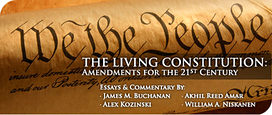As for repealing the Seventeenth Amendment: I once floated this idea as a thought experiment (in a footnote that appeared in The University of Chicago Law Review in 1988). [A pdf of the paper is here. See footnote 98 –ed.]. Then I did more research into the Amendment and the issue seems far more complicated.
Prior to the Amendment, many states had improvised de facto direct election systems via party primaries and nonbinding popular votes (aka “the Oregon Plan”). So mere repeal might not change much, unless these improvisations were also prohibited by amendment. Also, the Amendment was an important harbinger of one person/one vote, bypassing malapportioned legislatures and eliminating all sorts of democratic oddities that existed under the pre-Amendment regime. (For example, in 1858, Republicans outpolled Democrats in Illinois, but Douglas beat Lincoln in the Senate race thanks to various quirks of districting.) In addition, the Amendment has created an important pool of democratically-selected and foreign-policy savvy leaders who are plausible presidential candidates. (Governors and House members are also directly elected, but have much less experience with foreign policy; Cabinet members are not elected.)
The Seventeenth Amendment has also probably reduced corruption in state legislatures, whose members were, under the pre-Amendment regime, more than occasionally bribed in connection with Senate elections. And there are other effects to consider, as I explain in my discussion of the Seventeenth Amendment in my new book, America’s Constitution: A Biography, at pp. 409-15.
A better states’ rights modification of structure might be a term-limits amendment, which would increase traffic in the reverse-commute direction between DC and state capitals, as more termed-out Congress members would seek positions as state governors, etc. (And the expectation of this reverse-commute might change nationalizing incentives in Congress itself.) How might existing Congresspersons be induced to vote for such an amendment? See my new book at pp. 95-97, 294-95, 315-16, 417-18.
Also, if we are considering Senate changes, how about thinking about reducing the malapportionment of that body? (Again, for an account of how existing small states might nevertheless be induced to vote for such a change, see the above-cited pages.) And while we are at it, how about rethinking the electoral college? No state or major world democracy picks its chief executive this way. Why should the feds? (For more background on why the Founding generation embraced the college—largely to accommodate slave states—interested readers may wish to consult my book at pages 148-59, 36-47).
Finally, a proposed amendment to satisfy both libertarian free-traders and liberal egalitarians. How about allowing talented persons who come to our shores from abroad, become citizens, and then succeed here to run for President on an equal footing with those of us who were born in the U.S.A.? The reasons the Founders had for limiting the options of both voters and immigrants no longer would seem to apply. (For a discussion of why the Framers included the “natural born citizen” clause, see my book at pages 164-66).

